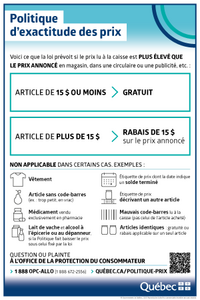Merchants exempt from the in-store individual product labeling rule are required to apply the Price Accuracy Policy. They must indicate the price of the items on a label (e.g., on a shelf), use an optical scanner at checkout and give you a detailed cash register receipt.
Merchants that indicate the price on each item are not required to apply the Policy, but they must abide by the individual product labeling rule. In the event of a pricing error or double labelling, they are required to sell you the item at the lowest advertised price (in the store, in a flyer, in an advertisement, etc.). Merchants are not required to compensate you, however, as the Policy does not apply.
Discounts under the Price Accuracy Policy
The Price Accuracy Policy provides for compensation if the price at the cash register is higher than the advertised price (in the store, in a flyer, in an advertisement, etc.). The merchant is required to:
- give you the item free of charge, if it is advertised at $15 or less;
- sell you the item at the advertised price, with an additional $15 discount, if it is advertised at more than $15.
The compensation applies to the lowest advertised price, not on the price at the cash register. It also applies if there is a pricing error at a self-serve checkout counter.
If you purchase identical items (e.g., 2 products from the same brand, format, colour, flavour or scent), and the same error appears for all of these items, the merchant must correct each error, but the requirement to give you the item or the $15 discount only applies to one item.
If you notice the error after the fact, you can return to the merchant and demand the compensation provided for under the Policy.
Taxes
You do not pay any taxes when the application of the Price Accuracy Policy results in an item being given to you free of charge. If a $15 discount is granted on the corrected price of an item, taxes must be calculated based on the amount you are actually paying.
Exceptions and special cases
The compensation provided for under the Policy does not apply to certain items:
- shoes and clothing, such as a sweater, a toque or a bathing suit. Certain wearable items, such as watches, life jackets or hockey helmets, are not considered clothing;
- Items without a barcode, such as fruits and vegetables sold in bulk, goods too small to have a barcode, etc.;
- medications sold exclusively in pharmacies;
- cow’s milk, if applying the Price Accuracy Policy would mean it would be sold below the minimum price set by law (web page in French only);
- alcohol products sold in grocery stores or convenience stores, if applying the Price Accuracy Policy would mean it would be sold below the minimum price set by law (in the case of a pricing error at a Société des alcools du Québec outlet, the compensation provided for under the Policy applies);
- tobacco products.
In the case of a pricing error, the merchant must sell you the item at the lowest advertised price.
The Price Accuracy Policy does not apply when a product is placed near a shelf label that describes another product.
For example: you are purchasing coffee. The bag is placed near a shelf label that displays a price of $5. At the cash register, the price is $8. The merchant tells you that the label’s description does not match the product, which was moved and is actually worth $8. In that case, the merchant is not required to compensate you, and is entitled to charge you $8.
Did the merchant forget to remove the label indicating the sale of an item once the sale has ended?
If an expiry date or a validity period for the sale clearly appears on the label, the merchant is not required to compensate you under the Policy. The merchant is entitled to sell you the item at the regular price.
If no expiry date or validity period is indicated, or if it is unclear or illegible, the Policy applies.
If the barcode read at the cash register is not for the product you are purchasing, the Policy does not apply.
For example: you are purchasing a bottle of shampoo for $4 and a bottle of conditioner for $3. The cashier charges twice for the bottle of shampoo, thinking you are purchasing 2 identical products. In that case, the merchant is not required to compensate you. However, the merchant must sell you the products at the advertised price.
What happens if there was an error concerning an item in a flyer or an advertisement, and the merchant made the correction by displaying an erratum at each cash register and near the item? You are entitled to pay the lowest advertised price, but the merchant is not required to compensate you under the Policy.
What happens if the price advertised online is less expensive than the in-store price? The Price Accuracy Policy only applies in certain cases. This would be the case if there is no indication that clearly specifies that the price is only valid for purchases made on the merchant’s website.
On the other hand, if the price includes an indication such as “Price applicable online only” or $50 online; $55 dollars in-store”, the Policy does not apply.
The Price Accuracy Policy does not apply to online purchases. However, you are entitled to pay the advertised price. Refer to the page titled “Advertised Price Different From Paid Price” to find out more.
If the price at the cash register is lower than the advertised price (in the store, online, in a flyer, in an advertisement, etc.), the merchant must sell you the item at the lowest price. However, you are not entitled to the compensation provided for under the Policy because the error is in your favour.
La Politique d’exactitude des prix prévoit un dédommagement si le prix lu à la caisse est plus élevé que le prix annoncé. Dans le cas où aucun prix ne serait annoncé (ex. : absence d’étiquette sur la tablette ou à proximité de l’article), aucun dédommagement n’est prévu par la Politique. Vous pouvez toutefois porter plainte à l’Office de la protection du consommateur, car le commerçant a des obligations relatives à l’indication des prix.
Recourse options
What happens if a merchant refuses to apply the Price Accuracy Policy when there is a pricing error at the cash register? What if the merchant refuses to charge you the lowest price, in a case where the Policy does not apply? You can file a complaint with the Office de la protection du consommateur. The page titled Contact Us lists our contact information.
Last update : December 9, 2025
Was the information on this page useful to you?
The information contained on this page is presented in simple terms to make it easier to understand. It does not replace the texts of the laws and regulations.












Thank you! Your comment was submitted successfully.